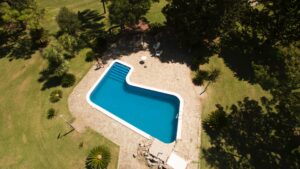Are you seeing rust or corrosion on stainless steel components in your swimming pool? What does the manufacturer or the pool shop say? They say it’s the water chemistry, right? Too acid or too alkaline or some costly chemical component they can sell you is missing. Wrong! It’s not the water. It’s not the chemicals. It’s inferior grade stainless steel and there is a lot more of it appearing in pools as manufacturers try to cut corners or move manufacture to locations that care less about standards and quality.
All metal pool components are supposed to be a special and rather expensive grade of stainless steel, called 316.
316 remains stainless in anything that you can possibly swim in, as well as in the ocean, and when immersed in some very strong chemicals. If there is any rusting, it is because the material is not 316 stainless steel, or it is faulty.
The only readily available chemical that can corrode stainless steel is very strong acid. Stainless is generally unaffected by alkali and if your pool shop says that staining is due to high alkalinity, they are wrong. In any case, the worst case ‘alkalinity’ in the average pool is very, very mild. You could not swim in it otherwise. For example, soap is much more alkaline than pool water and you really wouldn’t imagine soap could ever corrode any metal, much less stainless steel. Your dishwasher uses very aggressive alkaline salts in hot water every day and its stainless steel interior is simply cleaned not corroded. Does (alkaline) hair shampoo stain your stainless shower and bath fittings?
Think about it this way. How could anything that you can comfortably put your eye in, possibly rust stainless steel?
You can test this yourself by dropping some test screws in the skimmer box. If you buy a stainless steel screw from a marine supplier, it will not rust for many years in the far harsher environment of a boat on the harbour as compared with any swimming pool. It will last longer than the life of your pool and that is because it is 316 Grade. By comparison, a typical stainless screw from a hardware supplier, is usually a 304 Grade and this will eventually dissolve in the ocean and rust in the mild environment of a pool. It’s just not the same grade. Get your screws and bolts etc. from marine suppliers only. Do not ever use 304 grade stainless, mild steel or dissimilar metals in contact with each other in water…whether on a boat or in a pool. If you have rusting on a weld, it is probably the wrong sort of weld with dissimilar metals or else it is porous and poor quality.
Of course, you should manage the alkalinity and other chemistry of your pool, but only for sanitation and balance to protect the pool’s surface finish, but not to protect the stainless steel components in your pool. If you have the right quality of stainless, you do not need to worry about it. If you have a Pooled pool, you do not need to manage the water chemistry either as this is done automatically for you.



